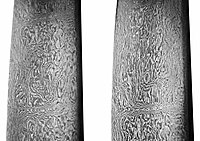
Photo from wikipedia
The study analyzes the effects of family of steel fibers on the thermo-mechanical, tribological and corrosive properties of Phenolic resin-based friction material. Tribological studies were performed on chase testing machine… Click to show full abstract
The study analyzes the effects of family of steel fibers on the thermo-mechanical, tribological and corrosive properties of Phenolic resin-based friction material. Tribological studies were performed on chase testing machine following SAE J661 standards. The brake seizure (corrosive stiction) due to corrosion is studied based on ISO 6315 test standard. The series of fibers used in this study include mild steel fibers, annealed steel fibers, and stainless steel fibers. The percentage by weight of fiber in all the composites was kept as constant at 12 % (Low metal series). For the purpose of comparison, another composite with 24 wt. % of stainless steel fiber was used in this study (High metal content). Experiments showed that the friction coefficient in general decreases with increasing temperature up to 300 °C and then was stable. Mild steel fiber reinforced composites fared better in fade and wear performance followed by annealed steel fibers. The highest friction (with poor consistency) and wear are found in the higher content of stainless steel fiber-based composite. Wear mechanism was studied by using scanning electron microscope.
Journal Title: FME Transactions
Year Published: 2019
Link to full text (if available)
Share on Social Media: Sign Up to like & get
recommendations!